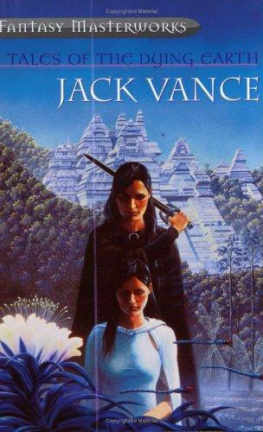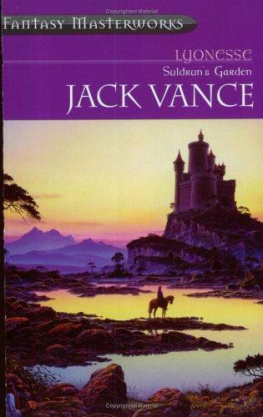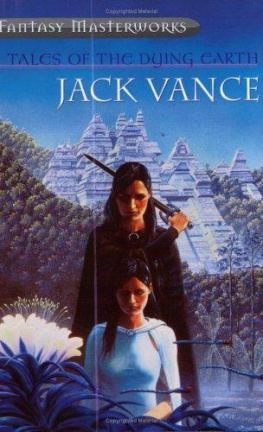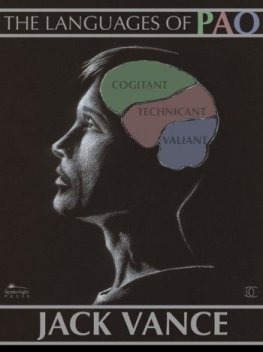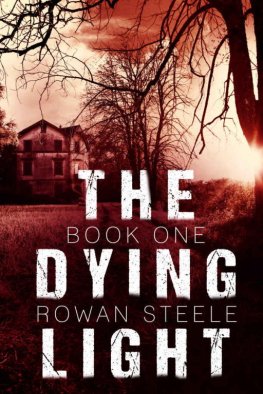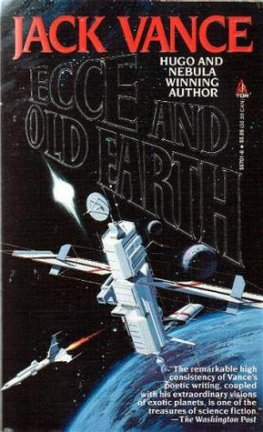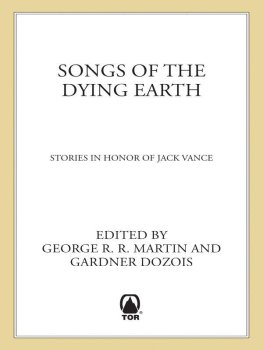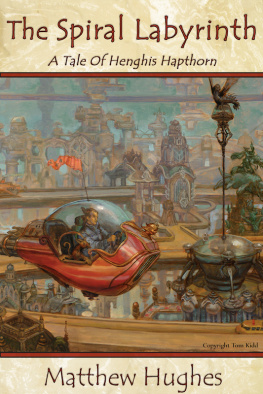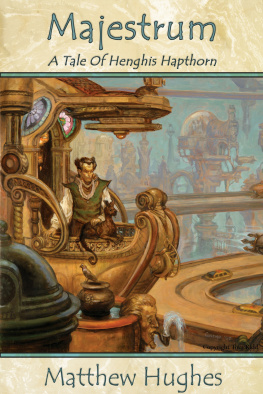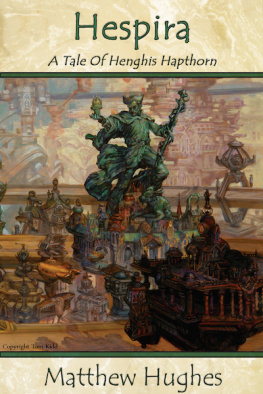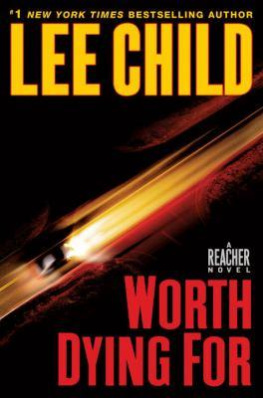The Dying Earth
1. TURJAN OF MIIR
TURJAN SAT in his workroom, legs sprawled out from the stool, back against and elbows on the bench. Across the room was a cage; into this Turjan gazed with rueful vexation. The creature in the cage returned the scrutiny with emotions beyond conjecture.
It was a thing to arouse pitya great head on a small spindly body, with weak rheumy eyes and a flabby button of a nose. The mouth hung slackly wet, the skin glistened waxy pink. In spite of its manifest imperfection, it was to date the most successful product of Turjan's vats.
Turjan stood up, found a bowl of pap. With a long-handled spoon he held food to the creature's mouth. But the mouth refused the spoon and mush trickled down the glazed skin to fall on the rickety frame.
Turjan put down the bowl, stood back and slowly returned to his stool. For a week now it had refused to eat. Did the idiotic visage conceal perception, a will to extinction? As Turjan watched, the white-blue eyes closed, the great head slumped and bumped to the floor of the cage. The limbs relaxed: the creature was dead.
Turjan sighed and left the room. He mounted winding stone stairs and at last came out on the roof of his castle Miir, high above the river Derna.
In the west the sun hung close to old earth; ruby shafts, heavy and rich as wine, slanted past the gnarled boles of the archaic forest to lay on the turfed forest floor. The sun sank in accordance with the old ritual; latter-day night fell across the forest, a soft, warm darkness came swiftly, and Turjan stood pondering the death of his latest creature.
He considered its many precursors: the thing all eyes, the boneless creature with the pulsing surface of its brain exposed, the beautiful female body whose intestines trailed out into the nutrient solution like seeking fibrils, the inverted inside-out creatures... Turjan sighed bleakly. His methods were at fault; a fundamental element was, lacking from his synthesis, a matrix ordering the components of the pattern.
As he sat gazing across the darkening land, memory took Turjan to a night of years before, when the Sage had stood beside him.
"In ages gone," the Sage had said, his eyes fixed on a low star, "a thousand spells were known to sorcery and the wizards effected their wills. Today, as Earth dies, a hundred spells remain to man's knowledge, and these have come to us through the ancient books ... But there is one called Pandelume, who knows all the spells, all the incantations, cantraps, runes, and thaumaturgies that have ever wrenched and molded space ..." He had fallen silent, lost in his thoughts.
"Where is this Pandelume?" Turjan had asked presently.
"He dwells in the land of Embelyon," the Sage had replied, "but where this land lies, no one knows."
"How does one find Pandelume, then?"
The Sage had smiled faintly. "If it were ever necessary, a spell exists to take one there."
Both had been silent a moment; then the Sage had spoken, staring out over the forest
"One may ask anything of Pandelume, and Pandelume will answerprovided that the seeker performs the service Pandelume requires. And Pandelume drives a hard bargain."
Then the Sage had shown Turjan the spell in question, which he had discovered in an ancient portfolio, and kept secret from all the world.
Turjan, remembering this conversation, descended to his study, a long low hall with stone walls and a stone floor deadened by a thick russet rug. The tomes which held Turjan's sorcery lay on the long table of black steel or were thrust helter-skelter into shelves. These were volumes compiled by many wizards of the past, untidy folios collected by the Sage, leather-bound librams setting forth the syllables of a hundred powerful spells, so cogent that Turjan's brain could know but four at a time.
Turjan found a musty portfolio, turned the heavy pages to the spell the Sage had shown him, the Call to the Violent Cloud. He stared down at the characters and they burned with an urgent power, pressing off the page as if frantic to leave the dark solitude of the book.
Turjan closed the book, forcing the spell back into oblivion. He robed himself with a short blue cape, tucked a blade into his belt, fitted the amulet holding Laccodel's Rune to his wrist. Then he sat down and from a journal chose the spells he would take with him. What dangers he might meet he could not know, so he selected three spells of general application: the Excellent Prismatic Spray, Phandaal's Mantle of Stealth, and the Spell of the Slow Hour.
He climbed the parapets of his castle and stood under the far stars, breathing the air of ancient Earth... How many times had this air been breathed before him? What cries of pain had this air experienced, what sighs, laughs, war shouts, cries of exultation, gasps
The night was wearing on. A blue light wavered in the forest. Turjan watched a moment, then at last squared himself and uttered the Call to the Violent Cloud.
All was quiet; then came a whisper of movement swelling to the roar of great winds. A wisp of white appeared and waxed to a pillar of boiling black smoke. A voice deep and harsh issued from the turbulence.
"At your disturbing power is this instrument come; whence will you go?"
"Four Directions, then One," said Turjan. "Alive must I be brought to Embelyon."
The cloud whirled down; far up and away he was snatched, flung head over heels into incalculable distance.
Four directions was he thrust, then one, and at last a great blow hurled him from the cloud, sprawled him into Embelyon.
Turjan gained his feet and tottered a moment, half-dazed. His senses steadied; he looked about him.
He stood on the bank of a limpid pool. Blue flowers grew, about his ankles and at his back reared a grove of tall blue-green trees, the leaves blurring on high into mist. Was Embelyon of Earth? The trees were Earth-like, the flowers were of familiar form, the air was of the same texture... But there was an odd lack to this land and it was difficult to determine. Perhaps it came of the horizon's curious vagueness, perhaps from the blurring quality of the air, lucent and uncertain as water. Most strange, however, was the sky, a mesh of vast ripples and cross-ripples, and these refracted a thousand shafts of colored light, rays which in mid-air wove wondrous laces, rainbow nets, in all the jewel hues. So as Turjan watched, there swept over him beams of claret, topaz, rich violet, radiant green. He now perceived that the colors of the flowers and the trees were but fleeting functions of the sky, for now the flowers were of salmon tint, and the trees a dreaming purple. The flowers deepened to copper, then with a suffusion of crimson, warmed through maroon to scarlet, and the trees had become sea-blue.
"The Land None Knows Where," said Turjan to himself. "Have I been brought high, low, into a pre-existence or into the after-world?" He looked toward the horizon and thought to see a black curtain rising high into the murk, and this curtain encircled the land in all directions.
The sound of galloping hooves approached; he turned to find a black horse lunging break-neck along the bank of the pool. The rider was a young woman with black hair streaming wildly. She wore loose white breeches to the knee and a yellow cape flapping in the wind. One hand clutched the reins, the other flourished a sword.
Turjan warily stepped aside, for her mouth was tight and white as if in anger, and her eyes glowed with a peculiar frenzy. The woman hauled back on the reins, wheeled her horse high around, charged Turjan, and struck out at him with her sword.
Turjan jumped back and whipped free his own blade. When she lunged at him again, he fended off the blow and leaning forward, touched the point to her arm and brought a drop of blood. She drew back startled; then up from her saddle she snatched a bow and flicked an arrow to the string. Turjan sprang forward, dodging the wild sweep of her sword, seized her around the waist, and dragged her to the ground.

